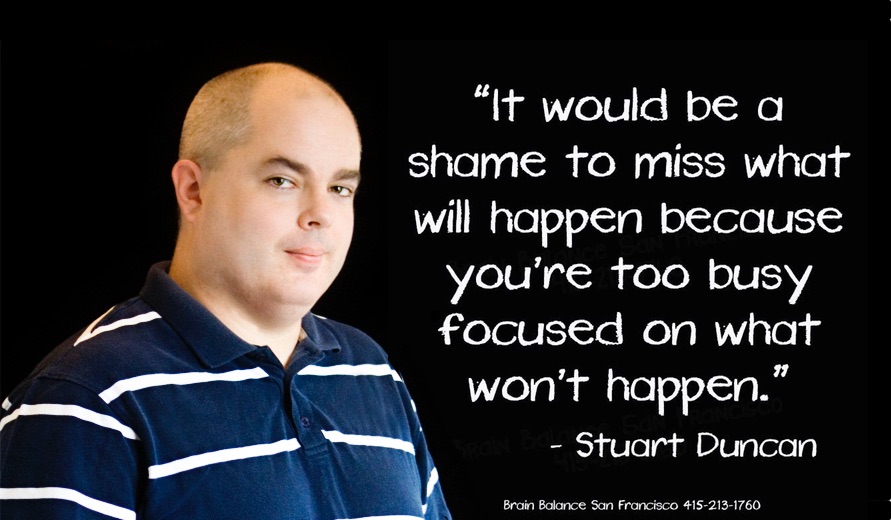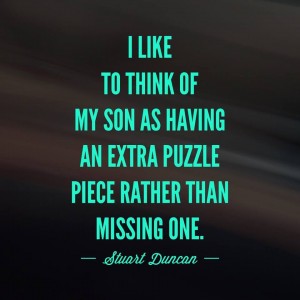A Foot in Both Worlds: My Interview with Stuart Duncan
If you have spent any time in the autism community online, chances are, you’ve heard of Stuart Duncan. Even before he created the now celebrated AutCraft — the world’s first Minecraft server dedicated to autistic kids — he was blogging all over the place about his own experiences as an autistic father of an autistic son. Those experiences have given him a foot two communities that often misunderstand one another. I figured Stuart would have some excellent advice for us Neuro-typical parents who are raising autistic kids, and he did not disappoint. Here is my interview with blogger, advocate, and all around great guy, Stuart Duncan.
Your son Cameron was diagnosed with autism when he was 2 1/2, and you say your experiences with him led to your own eventual diagnosis at 36. How did that happen? What kind of commonalities did you see between the two of you?
It’s funny but it was in all the ways that made him different, the signs that helped me to notice he had autism that I had never seen in myself until I was laying awake one night thinking… that reminds me of me when I was young.
When I would have an important talk with him, he couldn’t look at me. He’d keep his head down or stare at his feet as he kicked them. I did that. His teachers read a book to the class in September and he remembered it word for word in April yet he couldn’t remember the instructions that his teacher gave him 10 minutes prior. I did that. The way he’d focus on one topic and not be able to talk about anything else, even when others would try to digress the conversation on to something else, he would stay strictly on topic. I did that. The way he preferred to stay inside, in his room, by himself, content to just sit and play in one spot for hours… I did all these things.
As I laid there, memory after memory flooded over me all the way back to when I was 2 years old and each of them making me think… that explains that!
The more I thought about it, the more it made sense and over time, I was convinced that I most definitely did have autism as well, Aspergers at least. But I was still reluctant to say it to anyone unless I could have it diagnosed by a professional. And so, I did.
Interesting. A lot of autistic kids want to be left alone like you did, but we live in a world that wants them to be social. How did you deal with that tension as a boy, and how do you help your son work through it?
I had a bit of a dual life. My school life I spent in my room, on my own. I had few friends at school and no friends when I wasn’t at school. I had everything in my room that I needed to occupy my time and rarely left it.
In the summers though, it was a completely different story. I spent my summer’s at my grandparent’s hunting & fishing lodge where I worked in the restaurant and trailer park, around people just about the entire time. I learned to socialize and even become quite popular and well liked. I had no other real choice. However, when it did get to be too much, being so far remote, I was able to retreat into the woods to my favourite spot where I could just sit by the lake and relax for a little while.
It was chaotic in the summers and didn’t always go well but I always found time to take some quiet time for myself.
For Cameron, it’s tougher for him since he shares a room with his little brother and doesn’t have the same sort of freedom to just wander off into the woods. But we still make sure to give him that time and space as he needs it. I keep his little brother out of his way when he goes off to his room for alone time and we never rush him. There have been times when we’ve even had parties, like birthday parties, where Cameron will just disappear for 20 minutes or so. We explain to the other children that he’ll be ok and be back soon and sure enough, he rejoins the party as good as ever.
It really is something that more kids should be able to do I think, rather than let the tension and anxiety build up.
Back when you were a kid, there was very little understanding of autism in most circles. What are some positive changes you have noticed, and what would you MOST like to see change in our community?
Probably the best thing, which isn’t really a change in the community so much as an external factor which has improved things, is social media and how it’s allowed parents to connect and share stories and advice and be able to relate.
In the past and still to this day for many people, an autism diagnosis would often mean isolation… Now though, all they need is a social media account and there are literally millions of other people who know exactly how they feel that they can connect with and immediately have someone they can talk to any time they need them. It’s that sharing of information that has benefited everyone the most I think.
Unfortunately most of the dialogue that’s been taking place whether it be on blogs or in social media has been dominated by parents and in recent years, autistic adults. Often times this results in some rather large disagreements and those can get quite ugly sometimes.
What I’d like to see is a larger stake of those conversations being given to autistic adults that are also parents of autistic children. I really feel that while parents and autistic adults argue over who should be listened to more, those that fit into both camps are really being ignored completely.
I think that often comes down to there being extreme view points from one group or the other and that the autistics that have autistic children are often able to see these situations from both perspectives and end up offering up suggestions that offend neither but also appeases neither as well. This middle ground of understanding is extremely valuable but often ignored.
We’ve heard from doctors for years and learned very little. Then parents discovered that they could be heard via blogs and articles, and people started learning much more. Then autistic adults began to take control of the conversations about autism via social media. These have all made such a huge difference but now I feel like it’s time to bridge the gap and start paying more attention to autistic adults that have autistic children.
This is precisely the reason I wanted to talk to you. Between these two communities, so much gets lost in translation, and you are a gifted interpreter for all of us. And I, for one, need to learn more from the adult autistic community. So help me with that: I am the parent of a severely autistic child, and I have dealt with all the meltdowns, self-injuries and various difficulties of having a non-verbal son. What would you, as an autistic, like me to better understand about my situation?
My advice for any parent, no matter how autism affects their child, is to never give up on the hope and the faith that things will get better.
Thanks to these social networks and the Internet in general, we see more and more non-verbal autistics finding their voice whether it be by actually talking or alternate forms of communication and once that happens, their lives and the lives of everyone around them transforms dramatically.
It’s easy to think “everyone but me” there’s no reason that it can’t be you and your children too.
Also, even if not, these stories teach us that no matter how unlikely it may seem, your child is aware of your presence, your words, your efforts and your love. Even for those that can communicate quite well, people still throw around this stereotype about lacking empathy but I have never met anyone with autism that isn’t very aware and very appreciative of the love that their family gives them.
It’s your unconditional love and support that gets both you and your child through the toughest of times.
Treat and think of your child the same whether they have “severe” autism or “mild” autism or no autism at all. Talk highly of them, love them, do your absolute best for them and never speak as if they’re not there, or not listening, or a handful or now the person you want them to be. Because when you boil it all down, no matter the circumstances, they are your child and true love comes without conditions.
Excellent perspective. Thank you, Stuart. And thanks for all you do for our kids.
For more about Stuart, check out his blog, and of course, check out Autcraft.
You can follow him on Facebook and Twitter (@AutismFather).


